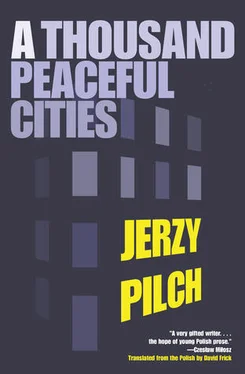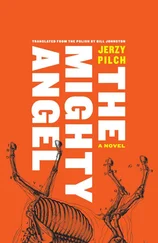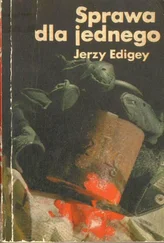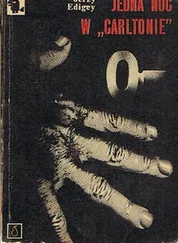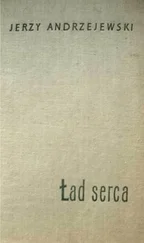Mr. Trąba lifted yet another cream pastry to his mouth, ate it slowly, exquisite bite after exquisite bite, drank a sip of coffee, drank a sip of lemon squash, and spoke further:
“I have no choice. Since I don’t know how to do anything, I can’t choose the field in which I could accomplish something before dying. I can’t dance, I can’t drive a car, I can’t ski, I can’t swim, I don’t speak languages, I haven’t mastered the axe or any other tool, I don’t know about nature, nor am I a technician, or a humanist. I don’t know about art or literature, I’m not a tinker or a collector, I’m not even, contrary to appearances, a flirt who flirts by listing his insufficiencies. My pal from the school bench, the most reverend bishop, stuck it out, finished, defended, wrote, worked, conducted activities, directed parishes, climbed up the rungs until he became a bishop of the Church. I don’t envy him, although of course every time I think of him I also think that if my life hadn’t been a disastrous life, but an edifying one, that his life would have been my life. Although that isn’t true either — that I don’t envy him. I do envy him. I envy him horribly, that he can send postcards to Mrs. Chief from every corner of the world, and I envy the care with which your spouse, Chief, collects, preserves, and orders that casual correspondence. .
“Of course there were moments in my wasted life when I got the audacious idea in my head to gain mastery of some earthly skill other than drinking, but upon reflection I rejected all those ideas. I drank all my life, and drinking was my work and my rest, my love and my hobby. Drinking was my art, my concert, and my artfully written sonnet. Drinking was my cognition, my description, my synthesis, and my analysis. Only amateurs, laymen, and graphomaniacs assert that you drink in order to soften the monstrosity of the world and to dull unbearable sensitivity. On the contrary, you drink in order to deepen pain and to heighten sensitivity. Especially in a case like mine: when there is nothing but drinking, it is necessary to make an art of drinking, it is necessary to reach the heart of the matter through drinking, and the heart of the matter is death. Since man is condemned to pain, since man condemns himself to pain, it is necessary to become a virtuoso of pain. And I, Józef Trąba, Grand Master of my own pain, now, when my bodily shell refuses to execute the only ability it possessed, I, Józef Trąba, have resolved that, before I die on account of one of seven unfailing reasons, I have resolved to take possession of one more, a one-time earthly ability, and that is, as we have known for a long time, the ability to kill First Secretary Władysław Gomułka.
“And so that there be absolute clarity,” Mr. Trąba raised his voice slightly, “so that there be absolute clarity, I wish to emphasize with all force that I do not blame Moscow for my unhappy fate. You, Chief, you were debased by Moscow, me — no way. No one bears the blame for my fate other than myself. If I were a truly great personality, I would cope with everything. Moscow, I grant you, is tearing this country apart, frustrating every initiative, befouling and debasing people, but truly great personalities can cope with Moscow. After all, strictly speaking, you can’t even say that Moscow poses a genuine challenge for truly great personalities, because it doesn’t pose one, it isn’t any partner, it isn’t any opponent, you can basically cope with it with childish ease. In spite of Moscow, a truly great personality will learn foreign languages, study the classics, plumb the depths of philosophy, listen to the great composers, even travel. A truly great personality will cope with the velvet Russification of this country by gaining perfect mastery of the language of Gogol, because, after all, that isn’t the language of Stalin. That’s right, Chief, if I were just a tiny bit stronger person, I would have sovereign mastery over myself and my innumerable abilities. But since it is entirely otherwise, I enter into history by the narrow path of the barbarian.”
Mr. Trąba glanced at his watch, then he cast his gaze over us and the dark interior of the confectioner’s shop, as if he were seeking the willowy shadow of the most beautiful waitress in the world, and he said:
“Time to pay the bill and do our duty.”
•
We stood in the penetrating cold, under leafless poplars. The rain had stopped. November constellations revolved above us.
“It won’t be long now,” Mr. Trąba said, and with a delicate motion he removed the crossbow from my shoulders. “After they return, the guards draw the shutters over the windows on the ground floor, so that no one can see how they swill vodka and play cards. But in his apartment on the second floor, the shutters, sometimes even the curtains, are left open until late at night. Accidental passersby and neighbors say that you can often see him quite well, especially when he stands in the window and smokes a cigarette, half a cigarette, since, for reasons of economy, he smokes halves. In glass cigarette holders.”
“Are you certain you will hit him? Do you even know how to shoot that thing?” I had the impression that, for the first time since the beginning of the expedition, Father had taken an interest in the real course of events, and that for the first time he had taken a look at the Chinese crossbow and arrow.
“I know how, and I will hit him,” Mr. Trąba replied, and his whisper was icy.
“Just exactly where and when did you learn and practice?” Father continued his inquiry.
“Chief! And do you believe in God? You do believe, don’t you? And how did you arrive at proficiency and skill in faith? You didn’t scheme. You didn’t wrestle with the problem of whether or not the grace of faith had been granted to you. You simply went to Sunday school, to lessons in religion, to confirmation class. You recited prayers, you sang Psalms — in a word, you behaved in general and in every regard like a pure-bred, believing, full-blooded Protestant, and before you knew it you were a pure-bred, believing, full-blooded Protestant. . You see, it’s just the same with shooting a crossbow.”
“You’ll forgive me, but your reasoning is a bit difficult for me to follow, Mr. Trąba.”
“I’m concerned with the spiritual aspect,” Mr. Trąba started to giggle unexpectedly and in a very peculiar manner. “I’m concerned with the spiritual aspect, plus practice, of course. Training is the way of life. Moreover, one mustn’t forget that this,” Mr. Trąba raised the crossbow to his shoulder, “is the weapon of the ancient Chinese. Therefore, one must take into account the teachings of the ancient Chinese. And the ancient Chinese say that when you shoot at your target, you must free yourself from trivial thoughts of the necessity of hitting it. The shot must have a spiritual scope, whereas the shooter must remain in intense tension until the shot falls upon the target like a ripe fruit falling, like snow from a bamboo leaf. .”
You could hear approaching cars and motorcycles, the slamming of doors. Lights were lit in the dark windows at which we had been staring for a good hour. Mr. Trąba extracted the arrow with the silver tip from the tails of his raincoat — it had been secured there on special loops that Mother had sewn on the coat — and, with unusual solicitude, he placed it on the bed of the crossbow. Terrifying cawing resounded. There must have been a thousand funereal birds sitting in the bushes.
“Crows live several hundred years. They will remember this moment centuries after our deaths,” said Father.
“Not only they,” Mr. Trąba took careful aim in the direction of the illuminated windows, “not only they will remember, Chief. . There he is! I see him! The ancient Chinese teach us to bow to the target before hitting it.”
Читать дальше
